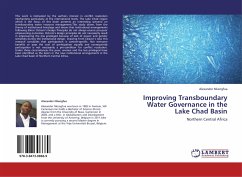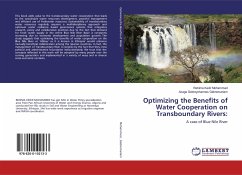Complexity of Transboundary Water Conflicts
Enabling Conditions for Negotiating Contingent Resolutions
Herausgeber: Choudhury, Enamul; Islam, Shafiqul
Complexity of Transboundary Water Conflicts
Enabling Conditions for Negotiating Contingent Resolutions
Herausgeber: Choudhury, Enamul; Islam, Shafiqul
- Gebundenes Buch
- Merkliste
- Auf die Merkliste
- Bewerten Bewerten
- Teilen
- Produkt teilen
- Produkterinnerung
- Produkterinnerung
'Complexity of Transboundary Water Conflicts' seeks to understand transboundary water issues as complex systems with contingent conditions and possibilities. To address those conditions and leverage the possibilities it introduces the concept of enabling conditions as a pragmatic way to identify and act on the emergent possibilities to resolve transboundary water issues.
Andere Kunden interessierten sich auch für
![Improving Transboundary Water Governance in the Lake Chad Basin Improving Transboundary Water Governance in the Lake Chad Basin]() Alexander NkengfuaImproving Transboundary Water Governance in the Lake Chad Basin32,99 €
Alexander NkengfuaImproving Transboundary Water Governance in the Lake Chad Basin32,99 €![Optimizing the Benefits of Water Cooperation on Transboundary Rivers: Optimizing the Benefits of Water Cooperation on Transboundary Rivers:]() Rehima Kedir MohammedOptimizing the Benefits of Water Cooperation on Transboundary Rivers:36,99 €
Rehima Kedir MohammedOptimizing the Benefits of Water Cooperation on Transboundary Rivers:36,99 €![Beyond 2%-NATO Partners, Institutions & Burden Management Beyond 2%-NATO Partners, Institutions & Burden Management]() Anessa L. KimballBeyond 2%-NATO Partners, Institutions & Burden Management88,99 €
Anessa L. KimballBeyond 2%-NATO Partners, Institutions & Burden Management88,99 €![Transboundary Protected Areas. A Comparison between the Wadden Sea and the Virunga National Park Transboundary Protected Areas. A Comparison between the Wadden Sea and the Virunga National Park]() Christian HackelTransboundary Protected Areas. A Comparison between the Wadden Sea and the Virunga National Park15,95 €
Christian HackelTransboundary Protected Areas. A Comparison between the Wadden Sea and the Virunga National Park15,95 €![Beyond 2%-NATO Partners, Institutions & Burden Management Beyond 2%-NATO Partners, Institutions & Burden Management]() Anessa L. KimballBeyond 2%-NATO Partners, Institutions & Burden Management88,99 €
Anessa L. KimballBeyond 2%-NATO Partners, Institutions & Burden Management88,99 €![Theory and Practice in Ethnic Conflict Management Theory and Practice in Ethnic Conflict Management]() Marc H. RossTheory and Practice in Ethnic Conflict Management64,99 €
Marc H. RossTheory and Practice in Ethnic Conflict Management64,99 €![Complexity Thinking for Peacebuilding Practice and Evaluation Complexity Thinking for Peacebuilding Practice and Evaluation]() Complexity Thinking for Peacebuilding Practice and Evaluation63,99 €
Complexity Thinking for Peacebuilding Practice and Evaluation63,99 €-
-
-
'Complexity of Transboundary Water Conflicts' seeks to understand transboundary water issues as complex systems with contingent conditions and possibilities. To address those conditions and leverage the possibilities it introduces the concept of enabling conditions as a pragmatic way to identify and act on the emergent possibilities to resolve transboundary water issues.
Hinweis: Dieser Artikel kann nur an eine deutsche Lieferadresse ausgeliefert werden.
Hinweis: Dieser Artikel kann nur an eine deutsche Lieferadresse ausgeliefert werden.
Produktdetails
- Produktdetails
- Verlag: Anthem Press
- Seitenzahl: 294
- Erscheinungstermin: 7. Dezember 2018
- Englisch
- Abmessung: 235mm x 157mm x 22mm
- Gewicht: 631g
- ISBN-13: 9781783088690
- ISBN-10: 1783088699
- Artikelnr.: 54889860
- Herstellerkennzeichnung
- Books on Demand GmbH
- In de Tarpen 42
- 22848 Norderstedt
- info@bod.de
- 040 53433511
- Verlag: Anthem Press
- Seitenzahl: 294
- Erscheinungstermin: 7. Dezember 2018
- Englisch
- Abmessung: 235mm x 157mm x 22mm
- Gewicht: 631g
- ISBN-13: 9781783088690
- ISBN-10: 1783088699
- Artikelnr.: 54889860
- Herstellerkennzeichnung
- Books on Demand GmbH
- In de Tarpen 42
- 22848 Norderstedt
- info@bod.de
- 040 53433511
Edited by Enamul Choudhury and Shafiqul Islam. With a Foreword by Lawrence Susskind, Ford Professor of Urban and Environmental Planning, MIT
List of Illustrations; Foreword, Lawrence Susskind; Prologue, Enamul
Choudhury and Shafiqul Islam; Part I The Conceptual Argument of the Book
and a Case Illustration; Chapter One Complexity and Contingency:
Understanding Transboundary Water Issues, Shafiqul Islam and Enamul
Choudhury; Chapter Two The Meaning and Logic of Enablement to Explain
Complexity and Contingent Actions, Enamul Choudhury and Shafiqul Islam;
Chapter Three Bridging Complexity and Contingency: Role of Three Enabling
Conditions to Resolve Water Confl icts in the Indus and Jordan Basins,
Enamul Choudhury and Shafi qul Islam; Part II River Basins around the
World: Case Studies; Chapter Four The Resolve to Cooperate on Danube:
Enabling Conditions for Transboundary Water Cooperation, Tahira Syed;
Chapter Five Governance of the Brahmaputra Sub- basin: Exploring the
Enabling Conditions, Nilanjan Ghosh and Jayanta Bandyopadhyay; Chapter Six
The Ganges River Water Sharing Agreement between Bangladesh and India: In
Search of New Mechanisms to Meet New Challenges, Ashok Swain; Chapter Seven
Agreement on Declaration of Principles on the GERD: Interdependence or
Leveling the Nile Basin Playing Field?, Salman M. A. Salman; Chapter Eight
Refl ections on the Colorado River, Kevin Wheeler; Part III Critical Refl
ection on the Argument of Complexity and Contingency and the Role of
Enabling Conditions; Chapter Nine Building a Shared Understanding in Water
Management, Bruno Verdini; Chapter Ten Zayandehrud Water Issues: How Can a
Negotiated Approach Be Developed?, Mehdi Fasihi Harandi; Chapter Eleven
Refl ections on Enabling Conditions through the Lens of Power Asymmetry,
Naho Mirumachi; Chapter Twelve Is the Engagement of Third Parties an
Enabling Condition of Transboundary Water Cooperation?, Paula Hanasz;
Chapter Thirteen From Pulp to Paper: How Understanding Laws Enhances
Cooperation and Enables Water Security, Alexandra Campbell- Ferrari and
Luke Wilson; Epilogue, Shafi qul Islam and Enamul Choudhury; Notes on
Contributors; Index.
Choudhury and Shafiqul Islam; Part I The Conceptual Argument of the Book
and a Case Illustration; Chapter One Complexity and Contingency:
Understanding Transboundary Water Issues, Shafiqul Islam and Enamul
Choudhury; Chapter Two The Meaning and Logic of Enablement to Explain
Complexity and Contingent Actions, Enamul Choudhury and Shafiqul Islam;
Chapter Three Bridging Complexity and Contingency: Role of Three Enabling
Conditions to Resolve Water Confl icts in the Indus and Jordan Basins,
Enamul Choudhury and Shafi qul Islam; Part II River Basins around the
World: Case Studies; Chapter Four The Resolve to Cooperate on Danube:
Enabling Conditions for Transboundary Water Cooperation, Tahira Syed;
Chapter Five Governance of the Brahmaputra Sub- basin: Exploring the
Enabling Conditions, Nilanjan Ghosh and Jayanta Bandyopadhyay; Chapter Six
The Ganges River Water Sharing Agreement between Bangladesh and India: In
Search of New Mechanisms to Meet New Challenges, Ashok Swain; Chapter Seven
Agreement on Declaration of Principles on the GERD: Interdependence or
Leveling the Nile Basin Playing Field?, Salman M. A. Salman; Chapter Eight
Refl ections on the Colorado River, Kevin Wheeler; Part III Critical Refl
ection on the Argument of Complexity and Contingency and the Role of
Enabling Conditions; Chapter Nine Building a Shared Understanding in Water
Management, Bruno Verdini; Chapter Ten Zayandehrud Water Issues: How Can a
Negotiated Approach Be Developed?, Mehdi Fasihi Harandi; Chapter Eleven
Refl ections on Enabling Conditions through the Lens of Power Asymmetry,
Naho Mirumachi; Chapter Twelve Is the Engagement of Third Parties an
Enabling Condition of Transboundary Water Cooperation?, Paula Hanasz;
Chapter Thirteen From Pulp to Paper: How Understanding Laws Enhances
Cooperation and Enables Water Security, Alexandra Campbell- Ferrari and
Luke Wilson; Epilogue, Shafi qul Islam and Enamul Choudhury; Notes on
Contributors; Index.
List of Illustrations; Foreword, Lawrence Susskind; Prologue, Enamul
Choudhury and Shafiqul Islam; Part I The Conceptual Argument of the Book
and a Case Illustration; Chapter One Complexity and Contingency:
Understanding Transboundary Water Issues, Shafiqul Islam and Enamul
Choudhury; Chapter Two The Meaning and Logic of Enablement to Explain
Complexity and Contingent Actions, Enamul Choudhury and Shafiqul Islam;
Chapter Three Bridging Complexity and Contingency: Role of Three Enabling
Conditions to Resolve Water Confl icts in the Indus and Jordan Basins,
Enamul Choudhury and Shafi qul Islam; Part II River Basins around the
World: Case Studies; Chapter Four The Resolve to Cooperate on Danube:
Enabling Conditions for Transboundary Water Cooperation, Tahira Syed;
Chapter Five Governance of the Brahmaputra Sub- basin: Exploring the
Enabling Conditions, Nilanjan Ghosh and Jayanta Bandyopadhyay; Chapter Six
The Ganges River Water Sharing Agreement between Bangladesh and India: In
Search of New Mechanisms to Meet New Challenges, Ashok Swain; Chapter Seven
Agreement on Declaration of Principles on the GERD: Interdependence or
Leveling the Nile Basin Playing Field?, Salman M. A. Salman; Chapter Eight
Refl ections on the Colorado River, Kevin Wheeler; Part III Critical Refl
ection on the Argument of Complexity and Contingency and the Role of
Enabling Conditions; Chapter Nine Building a Shared Understanding in Water
Management, Bruno Verdini; Chapter Ten Zayandehrud Water Issues: How Can a
Negotiated Approach Be Developed?, Mehdi Fasihi Harandi; Chapter Eleven
Refl ections on Enabling Conditions through the Lens of Power Asymmetry,
Naho Mirumachi; Chapter Twelve Is the Engagement of Third Parties an
Enabling Condition of Transboundary Water Cooperation?, Paula Hanasz;
Chapter Thirteen From Pulp to Paper: How Understanding Laws Enhances
Cooperation and Enables Water Security, Alexandra Campbell- Ferrari and
Luke Wilson; Epilogue, Shafi qul Islam and Enamul Choudhury; Notes on
Contributors; Index.
Choudhury and Shafiqul Islam; Part I The Conceptual Argument of the Book
and a Case Illustration; Chapter One Complexity and Contingency:
Understanding Transboundary Water Issues, Shafiqul Islam and Enamul
Choudhury; Chapter Two The Meaning and Logic of Enablement to Explain
Complexity and Contingent Actions, Enamul Choudhury and Shafiqul Islam;
Chapter Three Bridging Complexity and Contingency: Role of Three Enabling
Conditions to Resolve Water Confl icts in the Indus and Jordan Basins,
Enamul Choudhury and Shafi qul Islam; Part II River Basins around the
World: Case Studies; Chapter Four The Resolve to Cooperate on Danube:
Enabling Conditions for Transboundary Water Cooperation, Tahira Syed;
Chapter Five Governance of the Brahmaputra Sub- basin: Exploring the
Enabling Conditions, Nilanjan Ghosh and Jayanta Bandyopadhyay; Chapter Six
The Ganges River Water Sharing Agreement between Bangladesh and India: In
Search of New Mechanisms to Meet New Challenges, Ashok Swain; Chapter Seven
Agreement on Declaration of Principles on the GERD: Interdependence or
Leveling the Nile Basin Playing Field?, Salman M. A. Salman; Chapter Eight
Refl ections on the Colorado River, Kevin Wheeler; Part III Critical Refl
ection on the Argument of Complexity and Contingency and the Role of
Enabling Conditions; Chapter Nine Building a Shared Understanding in Water
Management, Bruno Verdini; Chapter Ten Zayandehrud Water Issues: How Can a
Negotiated Approach Be Developed?, Mehdi Fasihi Harandi; Chapter Eleven
Refl ections on Enabling Conditions through the Lens of Power Asymmetry,
Naho Mirumachi; Chapter Twelve Is the Engagement of Third Parties an
Enabling Condition of Transboundary Water Cooperation?, Paula Hanasz;
Chapter Thirteen From Pulp to Paper: How Understanding Laws Enhances
Cooperation and Enables Water Security, Alexandra Campbell- Ferrari and
Luke Wilson; Epilogue, Shafi qul Islam and Enamul Choudhury; Notes on
Contributors; Index.








